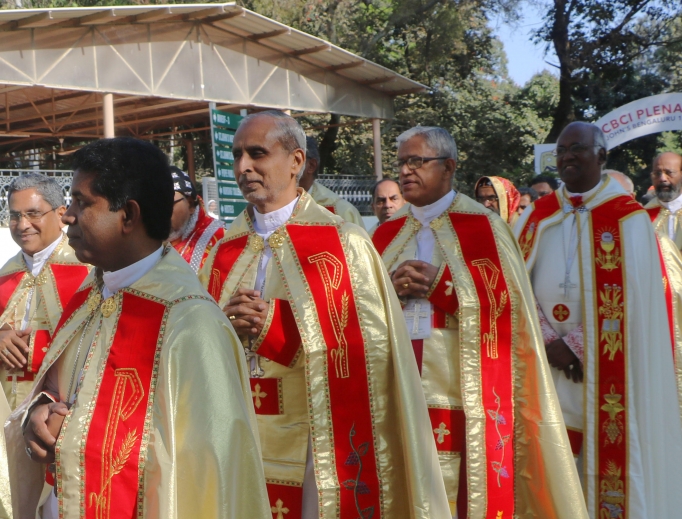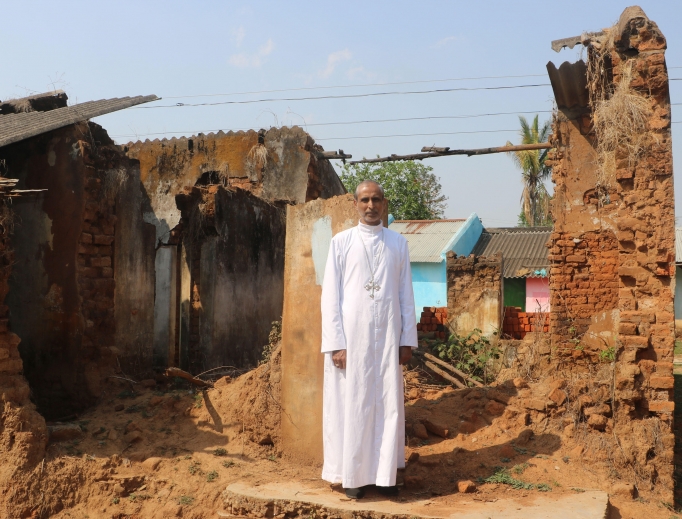Indian Bishop Muricken Seeks Nod to Enter Life of Prayer as a Hermit
Bishop Jacob Muricken, who garnered international attention after donating his kidney to a Hindu, is awaiting Church approval of his request to resign his episcopal duties to devote himself to a life of prayer and solitude.

KERALA, India — A junior bishop in India who made history in 2016 by donating his kidney to a Hindu has sprung another surprise: He’s pleading with Church leadership to relieve him from his duty as a bishop to embrace the life of a hermit.
“I am fully prepared and awaiting the green signal from the Church leadership,” Auxiliary Bishop Jacob Muricken of the Diocese of Palai in the southern Indian state of Kerala told the Register in an interview on June 2.
The 56-year old Bishop Muricken said after he had a vision in June 2017, he “reflected and prayed over the inner call” before writing a letter in July 2018 to the Synod of the Syro Malabar Catholic Church (SMCC), asking to relieve him as the auxiliary of the Palai Diocese.
“Since the SMCC Synod chose me a bishop, the synod has to approve my request before it is forwarded to the Vatican,” Bishop Muricken said. “Major Archbishop Cardinal George Alencherry [head of the SMCC] has asked me ‘to wait and prepare for it.’”
Since 2012, Bishop Muricken has been an auxiliary bishop of Palai, which is under the sui juris (self-governing) SMCC based in Kerala. The SMCC, which has its own liturgical rites and system of governance in union with Rome, traces its heritage to St. Thomas the Apostle.
“Prayer and solitude are integral to the life of the Church,” Bishop Muricken told the Register. “I have a call to be away from the world and lead a life of quiet prayer for the strength of the Church. It is a necessity for the Church and will only strengthen the evangelization work of the Church.”

Apart but a Part
Hermits, also known as anchorites, have a role in the Church and are acknowledged by canon law, Bishop Muricken said. Sts. Anthony the Anchorite (251-356), Jerome (347-420) and Bruno (1030-1101), the founder of the Carthusian monastic order, are notable for their lives as hermits.
According to the Code of Canon Law: ”In addition to institutes of consecrated life, the Church recognizes the eremitic or anchoritic life by which the Christian faithful devote their life to the praise of God and the salvation of the world through a stricter withdrawal from the world, the silence of solitude, and assiduous prayer and penance” (603).
Quoting Matthew 9:38-39, (“The harvest is plentiful, but the workers are few. Ask the Lord of the harvest, therefore, to send out workers into his harvest field."), Bishop Muricken said the Church needs “silent prayers” as part of that fieldwork to strengthen its mission.
“Even in our times, when part of the Church’s team is out in the world doing evangelization work, an equal or larger number of the team sits in prayer for the success of the mission. That has been the story of the Church,” Bishop Muricken said, citing the role of the Desert Fathers in the growth of the Church in ancient times.
However, Bishop Muricken noted, the global Church in present times is “pressed with too many pastoral and social commitments so that the role of the monastic support for the mission of the Church is getting sidelined.”
“More people should enter the path of prayer and solitude to strengthen the Church,” he added.
The news of Bishop Muricken seeking permission from the Church’s authorities to enter the eremitic life has gone viral on social media in Kerala, which is attributing diverse reasons for this unheard-of move in the history of the Church in Kerala. But Bishop Muricken is not concerned with gossip or falsely attributed motives for his decision.
“My request is a personal decision and is not influenced by anything else. Some lay people cannot accept this and are trying to pass on their own hypothesis. It is better to ignore them,” Bishop Muricken replied when asked about negative comments provoked by his decision.
The Register reached out to Bishop Joseph Kallarangatt of Palai for comment about his auxiliary bishop’s desire to become a hermit.
“I am not the competent person to speak about that [the bishop’s request],” Bishop Kallarangatt told the Register on June 3.
Simple Mercy
Already known for his simple and austere lifestyle, Bishop Muricken said he was inspired to donate his kidney to a struggling Hindu youth as an “act of mercy in the Year of Mercy” 2017 after listening to Father Davis Chiramel of the Archdiocese of Thrissur in central Kerala.
After Father Chiramel received enthusiastic support for donating a kidney to his Hindu parishioner in 2008, he set up the Kidney Federation of India, to facilitate kidney donation and support for those struggling with kidney ailments.
Bishop Muricken’s concern has also reached others within the Christian community in India. After this writer offered a presentation on the Kandhamal incident to the SMCC Synod of Bishops in January 2019, he was invited to accompany Bishop Muricken on a pilgrimage to Kandhamal two months later.
On the two-day March 2019 trip, Bishop Muricken displayed extraordinary pastoral concern for the persecuted Christians in this region. Besides giving money to the needy, such as widows of martyrs, he insisted on rushing back to the market to stock up on sweets to give to children wherever he went in the remote jungle region.
A photo of the lean bishop standing on the ruins of a house — destroyed during the persecutions and left unrepaired after a decade — reminded the world of the plight of suffering Christians.

A Life of Prayer
According to Bishop Muricken, the trip to Kandhamal helped clarify for him his call to the eremitic life.
“That visit has only strengthened my desire to lead a life of prayer and solitude for the good of the Church,” said Bishop Muricken, who has chosen to establish his hermitage in a remote ashram in the hilly region outside the Palai diocese once he receives permission from Cardinal Alencherry.
According to Bishop Muricken, the hermitage will be afforded basic necessities as defined by the eremitic life he hopes to embrace.
“Simple arrangements are being made for me to lead an austere life of prayer,” he told the Register. “I need to cook for myself, and there will be no luxury or technological facilities for public contact.”
Register correspondent Anto Akkara is based in Bangalore, India.

















